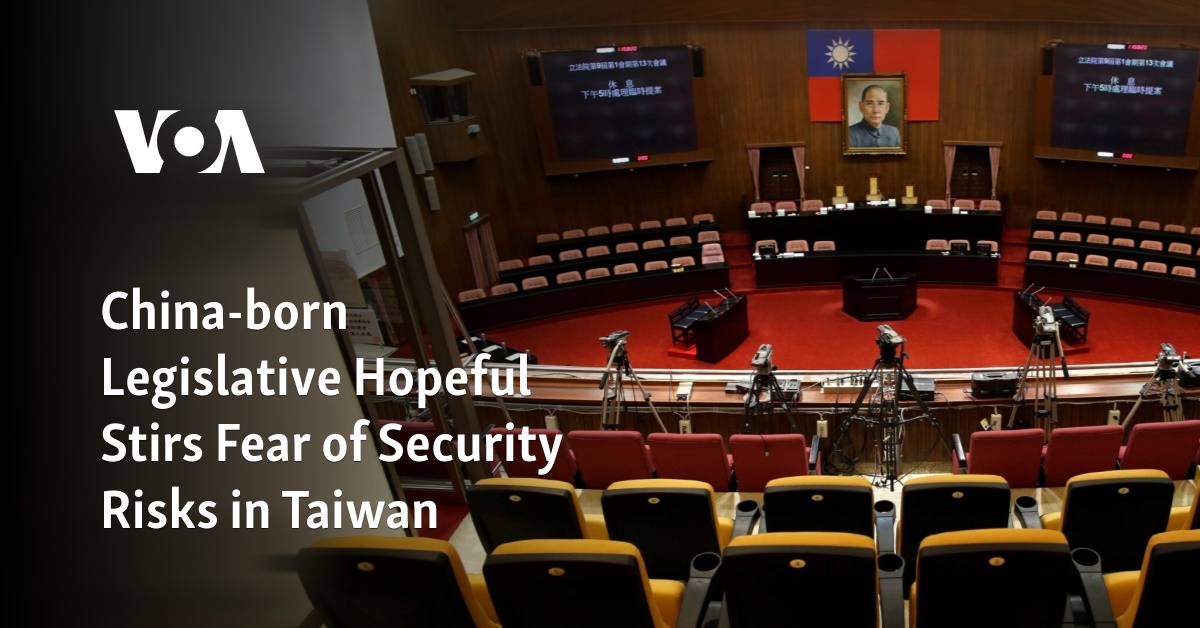
A Taiwan opposition party is thinking about nominating as one of its legislative candidates a woman critics say has close ties to the Chinese Communist Party, sparking a public uproar even before her name is officially on the ballot.
Hsu Chun-ying’s would-be candidacy has also called attention to the status of China-born spouses in one of Asia’s most vibrant democracies.
Born in Shanghai, Hsu became a Taiwan citizen over two decades ago. And while the Taiwan People’s Party has yet to officially nominate her, critics say she may pose a security risk if elected to office.
Hsu denies ever being a CCP member and rejects the accusations against her.
“If there’s any evidence that shows I have been a CCP member, I am willing to be declared my Taiwan citizenship null and face deportation by the Republic of China [Taiwan’s official name],” Hsu told a news briefing in Taipei last week.
In a phone interview with VOA Mandarin, Hsu also denied that she is a proxy for Beijing’s political goal of “reunification” with Taiwan.
While admitting that she did participate in past events that were organized by the Chinese Communist Party, she says that was all part of “normal cultural exchanges” since she is an advocate for Chinese spouses in Taiwan.
She says Taiwanese society should honor her right to run for a seat in the legislature.
Showcasing Taiwan’s democracy
“It’s the Taiwanese people’s choice with their votes to elect me into office. Shall I become a lawmaker, it will set a great example to showcase Taiwan’s democracy globally,” Hsu told VOA Mandarin.
Unlike other overseas-born spouses, who are required to renounce their nationality of birth to run for public office in Taiwan, Hsu hasn’t confirmed her loss of nationality in China. Chiu Tai-san, minister of the island’s Mainland Affairs Council or MAC, says she must do that before she can enter parliament.
But Hsu argues that Taiwan’s Constitution still sees China as part of its territory and that unless Taiwan amends its Constitution or declares independence from China, she has no way of initiating the renunciation process “to embody the state-to-state relationship” between Taiwan and China.
Lai Shin-yuan, a former MAC minister when Taiwan’s opposition Kuomintang was in power, has told local media that Chinese spouses have previously been required only to renounce their household registration and passport in China, never nationality.
A dual-nationality controversy?
The disagreement between incumbent and former MAC ministers has fueled the controversy over Hsu’s alleged dual-nationality status.
Chang Pai-ta, a director at the board of the Cross-Strait Policy Association in Taipei, says that while it is fair for Hsu to comply with Taiwan’s ban on dual-nationality candidates, the issue may need to be resolved by the island’s Constitutional Court.
Until that happens, he adds, the island’s growing distrust toward China has already affected the prospect for Chinese spouses to enter politics.
“Amid [China’s] increasing military intimidation, political suppression, and infiltration to endanger [the island’s] national security, the Taiwanese society has been keeping its guard up. That will negatively impact rights of Chinese spouses to stand for election. Many are worried about their allegiance. That is, in case of a military conflict across the Strait, who do you stay loyal to?” Chang told VOA Mandarin over the phone.
Another Sichuan-born Chinese spouse, Luan Shangguan, said there is little chance that China would provide Hsu or any other Chinese spouse with a certificate showing their citizenship in China has been revoked.
China is to blame?
“It is China which will refuse to issue such a certificate. The act of issuing the certificate will validate Taiwan as a lawful [government]. So, China won’t comply with it. This is the crux of the problem,” Luan told VOA Mandarin in a video interview.
She added that Hsu is obliged to clear the Taiwanese public’s doubts over her ties with the CCP because all candidates, regardless of their political affiliation, must face scrutiny in a democratic system.
Prior to Hsu, Hebei-born Shi Xueyan served as a council member in Nantou County, central Taiwan in 2021 – the island’s first Chinese spouse-turned-councilor.
Shi said she never felt discriminated against while serving her term, nor was she ever asked to renounce her PRC nationality.
And she supports Hsu’s bid to run for the legislative seat, saying the community of Chinese spouses in Taiwan keeps growing and needs a representative in the parliament to look after their rights.
Fair treatment
“We enter politics because we need an avenue to speak up and demand fair treatment after having lived here for so long. But there’s not much we can say as we’re caught in the crosshairs of cross-Strait relations. It is in our hope that both governments can develop a peaceful relationship, which will put us in a less awkward situation,” Shi told VOA Mandarin.
Statistics from Taiwan’s Immigration Agency show that, as of September, the number of Chinese spouses including those from Hong Kong and Macau totaled at 382,091, or 65% of all overseas-born spouses in Taiwan.
Shi said that Chinese spouses hope the Taiwan government can shorten the six-year wait for them to obtain citizenship as the wait for other overseas-born spouses is four years.
They also urge the local government to ease restrictions on residency status for their aging parents in China and children from previous marriages if they apply to visit.
This article originated in VOA’s Mandarin service.






Recent Comments